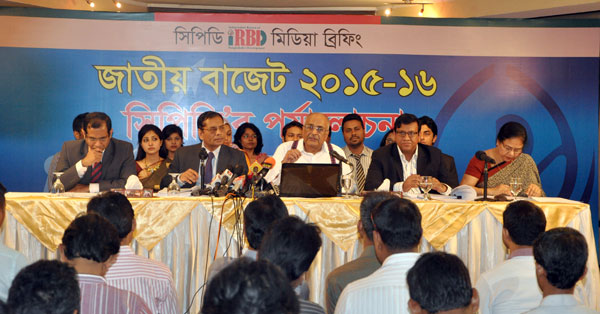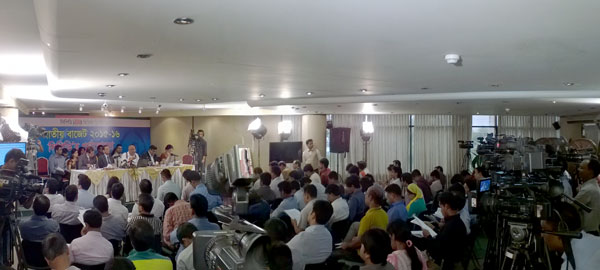The quality of fiscal planning is deteriorating over the last four years which is likely to continue while revenue collection targets set by the FY2016 budget may remain underachieved again.
Budgeting in Bangladesh continues to lack benchmarks on progress, expansion and plans concerning various measures and initiatives from the earlier budget.
CPD IRBD analysis suggested to incorporate a matrix for future budgets, articulating the progress of key initiatives in the preceding budget, and a plan and timeline for key milestones to be achieved during the upcoming budget period.

The observations emerged from a media briefing on the analysis of National Budget for FY2016 at Brac Centre Inn on Friday, 5 June 2015, prepared overnight following the Finance Minister’s budget speech the earlier day.
Following welcome remarks from CPD Executive Director Professor Mustafizur Rahman, the keynote analysis of the budget was presented by Dr Debapriya Bhattacharya, Distinguished Fellow, CPD on behalf of the CPD Independent Review of Bangladesh Economy (IRBD) team.
The analysis found a number of macroeconomic advantages to be supportive to budget formulation this year, including low inflationary pressure, declining interest rates, stable exchange rates, manageable fiscal deficit, upward trend in remittance flows, favourable balance of payments and augmented foreign exchange reserves.
However, the weakest link among all the indicators was net foreign borrowing as the budget aimed to utilise over USD 4.9 billion foreign aid which surpassed all previous aid utilisation targets. The aim of financing 82.5% of incremental deficit using foreign sources cannot be sustainable in the long term, mentioned Dr Bhattacharya.
Transport and power sectors were taking the lion’s share of ADP in the budget since FY2008, while other critical sectors including health, agriculture, education and social welfare are getting very low allocation.
Although revenue surplus helped to finance the Annual Development Programme (ADP) since 2012, significant drawbacks were observed in the inclusion of 860 unapproved projects, over 70 percent allocation for top five sectors and increasing concluding and carryover projects. ADP continues in indiscipline without result-based monitoring and reforms.
Total allocation for agricultural & allied sectors continues to decrease, flagged the analysis. To ensure fair prices for agricultural commodities, CPD proposed setting up of a Permanent Agricultural Price Commission on an urgent basis to ensure incentive price for the producers while maintaining market stability.
Inclusion of Child budget, retention of Gender budget and a number of Social Safety Net Programmes (SSNP) were welcomed. However, a number of proposed measures including green and eco tax, district budget, and progress of digitised land survey were missing from the FY2016 budget while the Chittagong Hill Tracts (CHT) Affairs ministry was lagging in terms of budgetary expenditure.
Dr Bhattacharya reminded that setting aside Tk. 5,000 crore for recapitalising state-owned banks using taxpayer’s money is not a viable idea without going for necessary reforms in the banking sector.
As regards taxation, CPD lauded a number of good moves including raising the ceiling for personal income tax and taxing allowance of government officials but did not find it fair to set the minimum tax of Tk. 4000 across all geographical locations.
Keeping silent regarding black money appears to be a continuation of earlier facilities to whiten black money, observed Dr Bhattacharya.
CPD urged to resume the stalled reform agendas concerning Public Services Act, PPP Act, Privatisation, Financial Reporting Act and implementation of VAT and SD Act 2012.
For a breakthrough beyond Bangladesh’s six percent growth, establishing five independent commissions on statistical validation, agriculture price, local government financing, public expenditure review and financial sector reform would be essential, noted the budget analysis.
The analysis presentation was followed by a Q&A session with the journalists.



